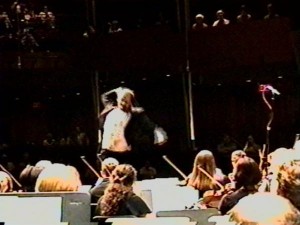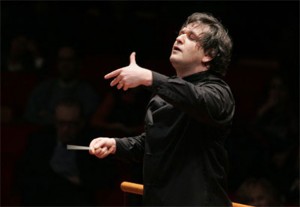So….. It wouldn’t have been too surprising if I had felt a little bit picked on the other day when a critic compared the noises I made while conducting Sibelius 7 to those made by a certain notorious women’s tennis champion:
-Tension and momentum were impressively sustained throughout, though the conductor’s energetic gestures to the strings brought with it some grunts (as at Wimbledon). Orchestral balance was commendable, given the chamber-orchestra size of the string sections.

Ken apparently favors a classic, Seles-ian grunt when conducting Sibelius

Do I look like I'm grunting? I suppose I probably might....
However, I remembered I’m in largely good company in my bad habits when I read this very funny blog post from the wonderful and witty blog, Intermezzo:
-A number of comments on my post about Thursday’s Tosca mention the distraction of Tony Pappano’s extremely audible huffing, puffing and grunting. For those who have yet to experience the phenomenon first-hand, imagine a lady tennis champion being taken from the rear whilst simultaneously executing a series of tricky backhands [emphasis added]. On this occasion it could, as one reader mentioned, be heard from the back of the stalls. He’s not the only conductor to join in of course – Sir Colin Davis’s iPod-style humalongs are well known. But he is possibly the noisiest.

Maria Sharpova: How do both Inter-mezzo and Antonio Pappano know what it sounds like when....

"grunt, grunt, grunt, puff, puff, puff"
A quick check of that Thursday post leaves no doubt as to the impact of Maestro Pappano’s performance:
-What really delivered the thrills tonight was a phenomenal performance from Tony Pappano and the orchestra. Rock’n’roll loud, raw as they come, the music swept everything along before it.
Commenters have grudgingly agreed:
-It cannot be denied though that the louder the racket, the better the orchestra seem to play. The less vigorously accompanied performances have generally not been the best ones. Whether it encourages the band, or just helps him focus in on the conducting, is hard to say.
Although some don’t seem to see a correlation between grunting and musical excitement:
-Pappano “huffing puffing & wooffling” was off-putting even up in the amphi! Someone really ought to say something – I’m sure he’s not aware of it himself, but its (sic) getting like certain lady tennis players.
But even so, one keeps reading this sort of thing:
-I agree with everything said about this superlative performance and the brilliance of Pappano. For me he is the greatest conductor, certainly of Tosca.
-I dont know who was more thrilling, but got to give it to Pappano for such an unbelievable sound. He turns that orchestra into a pouncing, trembling, roaring jungle animal. [emphasis added]
Of course, it’s not just Tony and me who bring back memories of Wimbledon when we take the podium. My friend Richard Hickox had a reputation for noise making, as recalled by one of the Intermezzo commenters:
-Richard Hickox was also well known for it; a performance of Billy Budd at ROH had him being hit over the head with a programme by an irate attendee who said “will you stop that?” to which he profusely apologised with his customary grace at the first opportunity in the interval.
I would discourage audience members from attempting the same thing with me- I fear my impulse control may not be as good as Richard’s…
All it took was googling “Gergiev grunting” and I found this blog post at the very top of the list, among pages and pages of results, entitled “Gergiev’s Grunting Shostakovich”
-Anyway, Symphony No 1 is quite accessible and full of loud explosions and power and vigour so it is easy to like. The orchestra obviously had loads of fun playing it. Given my location in the cheap seats (front row to the side) as the performance was a sellout, I not only had a curious view of the backs of the string section, but also I heard what sounded like strange grunting sounds. At first I thought it was the conductor but then surely not. But throughout the four movements of the First Symphony I could hear it. Was it the bowing of the strings? Well the acoustic from my seat was giving me an interesting flavour of the performance so that was a distinct possibility…The grunting was coming from Gergiev, and so there is a lesson there for seeing future performances with the LSO’s next chief conductor: don’t sit in the cheap seats unless you like a grunt with your classical music. Further back you might not hear it.
And it’s not just bloggers. The Times has noticed:
-Gergiev, known for his Wimbledon-style grunting at the podium, is a truly terrifying sight in the flesh – imagine Tony Soprano’s stockier, stubblier and generally less cuddly-looking half-brother.
Googling “Celibidache grunting” gets a similar range of responses, although not all are negative:
-And i dig Celibidache’s noises–grunts and yells which punctuate his rendition!
Google any other really interesting conductor’s name and the word “grunting,” and you can find a similar laundry list of whinges and complaints, except, I would guess, for Haitink and Weller, who, lets face it, are in a different league these days, although overpowering intensity is not their thing.
What saddens me about a lot of these comments is that they write about huffing and puffing as though it were a bad thing…
It turns out scientists have figured out it works in tennis.
So many of these comments seem motivated by the idea that these conductors get these results in spite of the way they engage their breathing while conducting.
Remember this comment from one commenter at Intermezzo:
–I dont know who was more thrilling, but got to give it to Pappano for such an unbelievable sound. He turns that orchestra into a pouncing, trembling, roaring jungle animal.
If there was ever a description of orchestra playing that would make me want to buy a ticket, that is it!
Conducting is not supposed to be pretty business. I wrote an early post here about sweating on the podium- even Abbado sweats!
I never intentionally or knowingly grunt (okay, maybe in rehearsal), but I come by my various huffs and puffs honestly.
This is important- if you do it knowingly, it’s an affectation, a mannerism. It means you’re concentrating on putting on a show of how engaged how are rather than being engaged in the music
It all started when I was conducting Walter Piston’s incredible 2nd Symphony. It’s all good, but the slow movement might be the greatest slow movement in an American symphony.
I was rehearsing it in a dead-sounding, fluorescent-lit rehearsal space one night, and magic was most definitely not happening. I implored, and I coaxed and I waved and carved as best I could, but the sound remained listless and disengaged. Finally, I started huffing and puffing, and within seconds the orchestra’s playing had changed. Something about making my breath come alive, something about the intensity of the music find a place right in my center got the players connecting with their sound in their guts instead of their foreheads. I’m sure I had huffed and puffed many times before that, but that was the first and only time I knowingly and intentionally tried it on purpose, and the result, the transformation, was rather overwhelming.
Really, a conductor’s strongest tools are his or her eyes and her or his breath. The stick is way down the list. Maestro Pappano is considered by many smart people to be the most exciting conductor on the planet right now. Every where he goes, people talk about the intensity of the string playing he gets out of whatever orchestra he is conducting. Isn’t it obvious that Pappano is not doing something wrong, he’s doing something right.
Remember “the louder the racket, the better the orchestra seem to play?”
His grunting, like Gergiev’s, Rattle’s, Noseda’s and Nelsons’, is a matter of public record and debate, yet he’s the one conductor in the country people are camping out overnight to see conduct Tosca. Those other guys are doing pretty well, too. Rather than thinking of their huffing and puffing as a distraction from the show, think of it as part of the show, as it would be at a rock concert (and let’s face it, Tosca should be a rock concert). Lighten up, classical fans!
When people talk about modernizing classical music, they usually mean cheapening it. Embracing the same corporate mindset that has essentially destroyed the pop recording industry is not going to get young people excited about classical music. What young listeners can’t understand is the way so many classical artists seem to be holding the music at arms length. It’s why some industry types thing young audiences are fooled by replacing one artifice (the regal artist in penguin suit) with another (the slob who doesn’t bathe or the bimbo who shows all she can).
They’re not fooled. That’s why 15 years of bimbos and slobs hasn’t reinvigorated the industry. Pappano’s Covent Garden doesn’t need reinvigorating, though.
To those of you who express irritation about Maestro Pappano’s grunting, I can only say- you’re lucky to be in the same building with anyone who can turn an orchestra into “a pouncing, trembling, roaring jungle animal.”
I wrote of my delight after my first concert with Orchestra of the Swan about how the orchestra played Haydn not like some bland background music, but with foot-stomps, grunts and huffs coming not from me but from the orchestra. The audience went suitably berserk. I’m convinced that young people today, faced with a media of unprecedented blandness and banality, and a future of terrifying uncertainty, are looking for honesty and immediacy in music, not more distance and artificiality. If I could get “pouncing, trembling and roaring” from my orchestras, I’d grunt in every bar.
Young conductors- you can’t just start grunting, huffing and puffing and expect to get results like Pappano and Woods (!)…. You’ve got to have a concept of the piece and the sound you want that is so vivid, that you are so committed to, that the noises can’t be stopped.
Of course, I couldn’t help but be mildly chastened by that comment about my grunting the other day- mostly because I have no memory whatsoever of doing it. It is un-nerving to discover you have been doing something in front of hundreds of people which you were completely unaware of at the time. Slippery slopes, you know…. I shall try to do better. As I said- one never chooses to grunt. However, the last thing I should be thinking of in Sibelius 7 is not grunting. I should be thinking about getting that sound….
I really hope nobody says anything to Maestro Pappano, and if they do, that he pays it no attention. I want to hear that band as a pouncing, trembling, roaring jungle animal, and I’ll be damn cross if I missed out on the pouncing or the trembling just because the maestro is trying to stop roaring.
More discussion here
http://www.talkclassical.com/10635-conductors-grunting.html
Or in the comments of this review:
http://www.guardian.co.uk/music/2010/sep/27/bbc-philharmonic-noseda-review
The critic, Tim Ashley, hadn’t noticed, but readers had. One comment: “Singing conductors are incredibly annoying” is invalidated because it comes from someone named “hotpants.” Nothing is more annoying than calling yourself “hotpants’
Not even singing conductors
An update from the latest Intermezzo
http://intermezzo.typepad.com/intermezzo/2011/07/victoria.html
“There was something missing from tonight’s Tosca – the Maestro’s vocal accompaniment. Has he bowed to public pressure and resolved to conduct in silence?
All I will note is that he produced another superb orchestral performance, yet without the frantic energy and earbusting volume of Thursday night’s. It was more refined, more subtle in its accents, but perhaps less exciting. Which is best – and does the grunting help? Let the DVD producers decide.”
Say it ain’t so, Tony! Say it ain’t so!